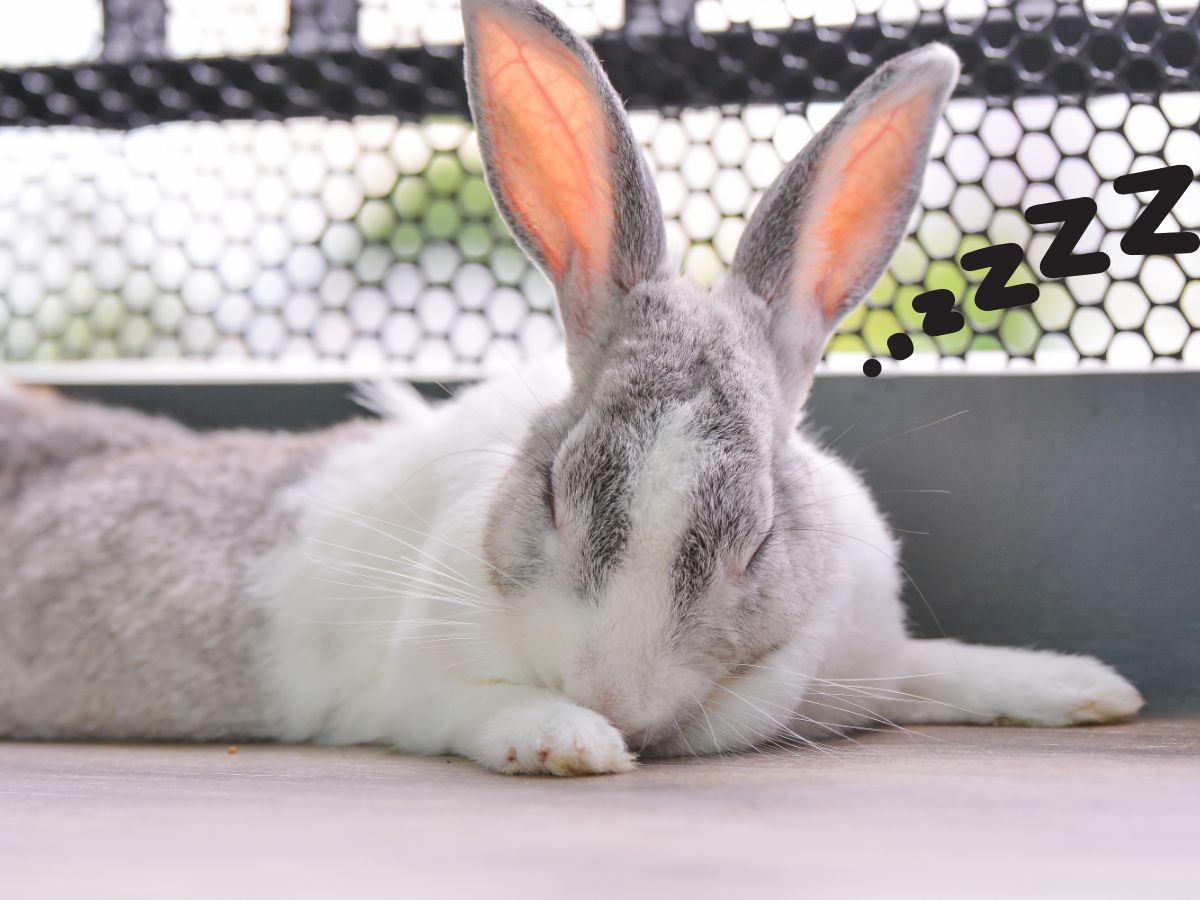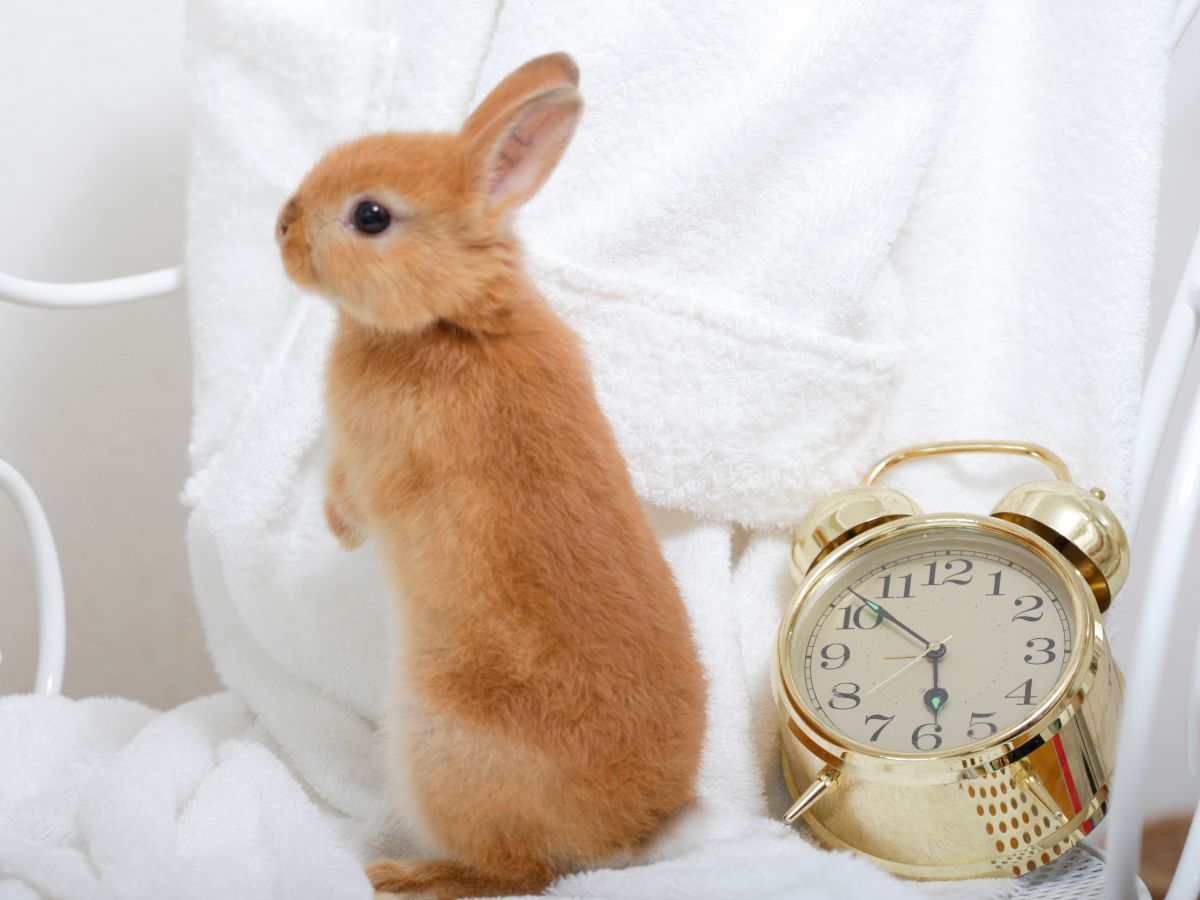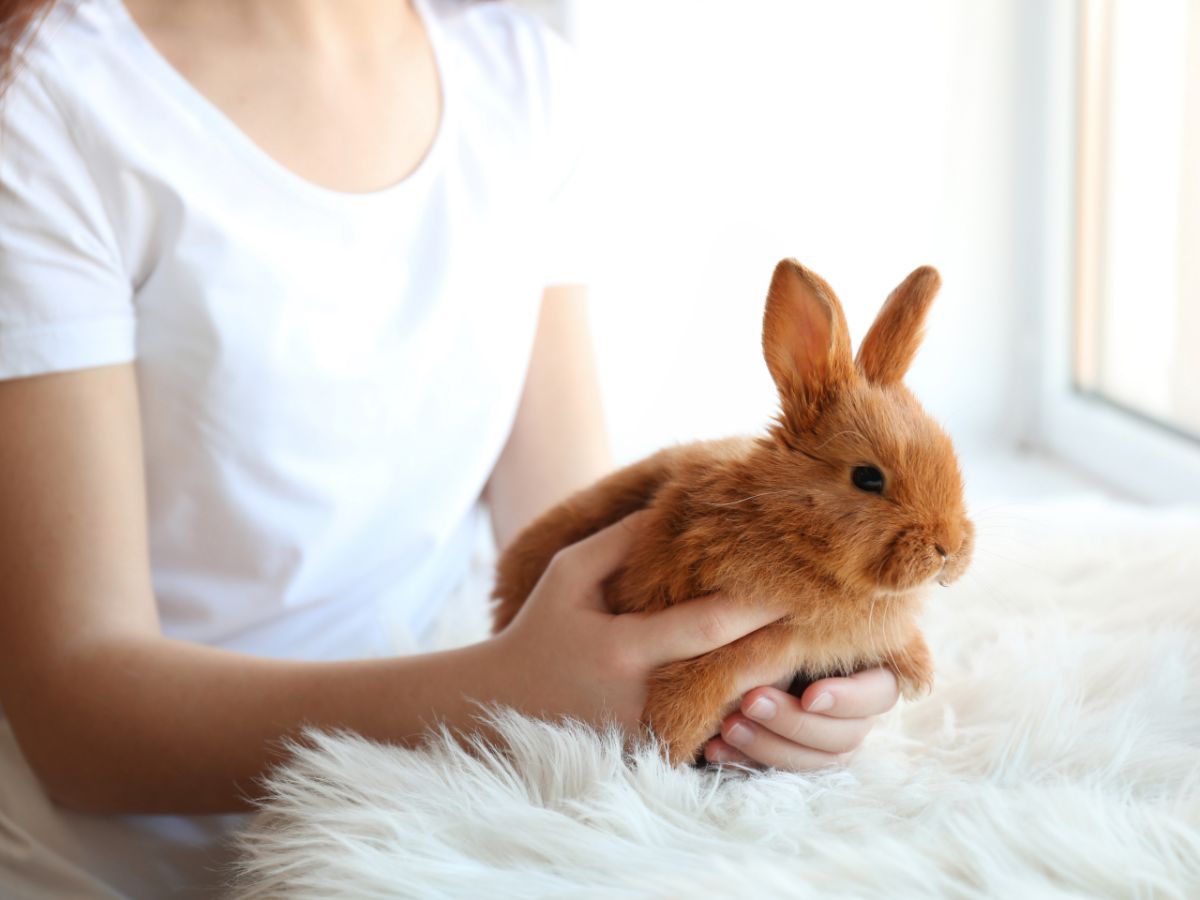Have you ever wondered what the natural rhythm of your pet rabbits’ day looks like? You may be surprised at how their day is structured as it is very different from yours, but just like you, they must get enough good sleep.
Adult rabbits sleep an average of eight to twelve hours in a day. Young bunnies need up to 20 hours of sleep. Rabbits sleep from the late mornings into the early evening and then again in the middle of the night. A crepuscular sleeping pattern is common among animals who are hunted by predators.
If you’re curious about how well your pet rabbits’ sleeping habits will fit in with your schedule, read on to find out about their favorite sleeping spots, what they need for a good rest, and how to figure out when your bunny is sleeping.
Contents
How Many Hours Of Sleep Does A Pet Rabbit Need?
As far as pets go, rabbits are probably as cute as they come! But taking good care of your bunny requires that you understand that their sleeping habits differ significantly from yours.
On average, adult rabbits require around eight hours of sleep a day, and young bunnies, especially those still nursing, will need as much as twenty hours of sleep in a day. They will gradually spend more time awake as they mature.
Which Times Of The Day Do Rabbits Sleep?
Animals who display a crepuscular sleep pattern have adapted their sleep patterns to be awake when predators are on the prowl. A rabbit’s sleep cycle is broken up into two sections.
Rabbits will sleep from late morning until sunset. From dusk, they will be pretty active until midnight, when they get another few hours of sleep. At sunrise, they will again be active till late morning.
This means that during the day, your rabbit will need some shut-eye, and you will be disturbing him by trying to get your bunny to play during these hours. This may be ideal if you are at work during the daytime, as your rabbit will be sleeping anyway.
Interacting with your rabbit early in the morning and then again in the early evening after you get home from work will work great for both of you. Depending on your bunnies’ age, they require roughly 1 to 3 hours of play daily.
Rabbits are naturally social, so use the time your bunny is awake to cuddle, play games, and allow lots of free-roaming and exploring to keep them happy and healthy.
Does It Need To Be Dark For Your Rabbits To Sleep?
Because rabbits are crepuscular, they will sleep during daylight hours as well as during the night. To remain healthy, they need a healthy contrast of light and dark. They are burrowers and prefer darker places as sleeping spots, but they are perfectly comfortable with nodding off mid-morning.
Too much artificial light at night when your rabbit is trying to sleep can cause health problems. Ensure that your rabbit’s hatch is covered with a blanket and that there is no electronic equipment or lights that will disturb their sleep.
Your Pet Rabbits Favorite Sleeping Positions
Just because your pet rabbit’s eyes are open doesn’t mean it is awake. Rabbits have the uncanny ability to sleep with their eyes open, but other clues will indicate whether your bunny is fast asleep or not.
Rabbits have a translucent third eyelid that shields their eyes when they sleep with their eyes open. In the wild, rabbits are prey to many predators, and going to sleep puts them in a vulnerable position. The third eyelid protects their eyes while allowing them to be aware of sudden movements that may signal danger while they sleep.
You can tell a lot about your rabbit by taking note of its sleeping habits. A more relaxed rabbit will start to close its eyes while napping. When your bunny gets shut-eye without actually shutting its eyes, it may mean she is slightly more anxious.
Making your rabbit feel safe and protected is a big part of gaining their trust. A calm rabbit will have slowed, deep and steady breaths while sleeping. The more relaxed they are during sleep, the safer they feel in their environment.
The biggest giveaway that your bunny has drifted off is that her ears are folded down. Rabbits are generally alert and looking for danger, which means they constantly listen and scan their environment. With sleep, their ears finally get a break.
The two most common positions that your bunny will assume are the “loaf” position or the “flop” position. A “flop” position is when your bunnies’ feet are spread out to the side, perfectly relaxed. In the “loaf” position, all her feet are neatly tucked underneath her body, with the ears lying flat along her back.
Where Do Pet Rabbits Sleep?
Naturally, rabbits prefer to sleep in a burrow in their natural habitat. Domesticated rabbits will retain this instinct and either burrow under a hay bed before settling down.
Rabbits prefer sleeping quarters with a covering over their heads and a clear entry and exit point. This mimics what they would be used to in the wild. Make sure your rabbit’s hatch has a private section where they can get some decent sleep.
Provide plenty of clean hay, shredded paper, or fabric in your rabbits’ hatch so that she can safely burrow in for a nap. Alternatively, there are very cute bunny beds and accessories that you can buy to create a comfortable spot for your favorite fluffy.
As the bond with your favorite bunny deepens, she may also feel comfortable finding sleeping spots around the house. If your bunny takes a nap under your sofa, allow her to wake up by herself and avoid digging her out of her little hiding spot.
As your rabbit becomes more confident, it may flop down after an energetic play session. Make sure that wherever she flops down, your bunny is safe from other pets or family members accidentally tripping over her. If she needs to nap in an unusual place, try not to disturb her.
Can Rabbits Sleep In Your Bed?
As you get closer, your rabbit may want to sleep in your bed. The soft blankets, extra warmth from your body, and the option of “burrowing” under the duvet may seem irresistible to your fluff friend.
The fact that your rabbit feels safe enough to sleep on the bed with you is a compliment and shows that she has developed great affection for you. Rabbits are social animals by nature, and she considers you part of her tribe.
Take safety measures if you choose to have a bunny in your bed. Ensure your rabbit is adequately trained and keep her litter tray in your bedroom. Be aware that you may accidentally roll over your bunny and suffocate her by mistake. A good idea is to use pillows to stop you from rolling over too much in your sleep.
Remember that your rabbit will wake up at dawn, disturbing your sleep. If you prefer to rise early, it may suit you to wake up together. But use caution if you get grumpy when you lose too much sleep.
Conclusion
Good quality sleep is essential to your rabbit’s health, so understanding her unique needs and providing safe places for her to settle down is essential. An average of eight hours of sleep a day for adult rabbits and as much as twenty hours of sleep for very young bunnies should be sufficient.




